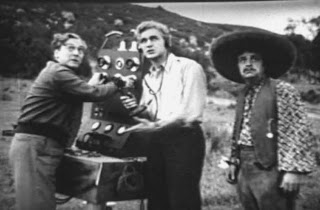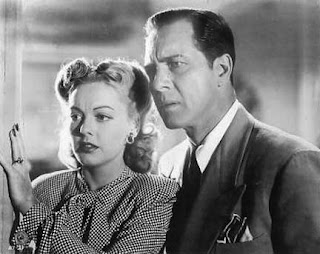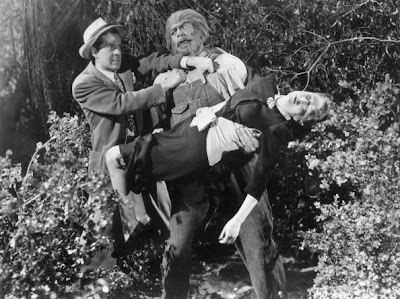Starring: Rosemary La Planche, Michael Hale, Nolan Leary, Monica Mars, Molly Lamont, and John James
Director: Frank Wisbar
Rating: Four of Five Stars
Nina (La Planche) driven to a mental breakdown when she learns her dead father was not only a murderer but may have also been a vampire, is placed in the care of manipulative psychiatrist Dr. Morris (Hale). When his wife (Lamont) is murdered, everyone--including Nina herself--believes she did it in a fit of madness... everyone except handsome Ted Masters, the dead woman's son who has fallen in love with Nina. He sets out to prove Nina's innocence and that his step-father is the killer.
Taken on its own, "Devil Bat's Daughter" is an okay little horror flick that suffers from stiff acting, clunky dialogue, and strange story continuity lapses (such as a continuing back-and-forth about whether the "Devil Bat" of the title--a local mad scientist who either came to a bad end at the fangs of his own monstrous creations but only after they killed half a dozen others, or who was put on trial for murder and presumably executed). The majority of the story elements are familiar elements of horror movies and thrillers of this vintage--a woman shocked into amnesia, a corrupt psychiatrist who may or may not be abusing his patients, and a bland hero whose only defining quality is that he is in love-at-first-sight with the imperiled heroine--there are a number of other factors that make this an unusual film and worth checking out.
The primary of these is the sympathetic portrayal of the "other woman" with whom the slimy psychiatrist is two-timing the wife he obviously only married for money. Rather than being a coldhearted and scheming bitch who is every bit the villain that he is, she is another victim of his manipulations, and she ultimately comes across as remorseful. Almost as important is the titular character, who, although little more than a conduit for melodrama, is also the pivot-point for enough plot substance that there are genuine questions in the minds of viewers that she might indeed be an unhinged, murdering somnambulist. This is all too rare in pictures of this production level and period, where plot misdirection and obfuscation usually feel halfhearted and are often painfully transparent. Screenwriter Griffin Jay and director Frank Wisbar truly rose above the standard for this kind of movie in this case.
Unfortunately, the film is less successful as a sequel to the original "Devil Bat" picture. While I admittedly might be a bit more of a stickler for continuity than many movie viewers, I still think anyone who saw "The Devil Bat" would wonder how/why the small town that was home to Paul Carruthers moved from the American Midwest to the East Coast, or why everyone from the town gossipers to the courts seem to have forgotten that Carruthers confessed to committing several premeditated murders using a trained bat before being killed by said bat in front of witnesses, or how Carruthers somehow transformed in everyone's mind from a well-respected local chemist and pillar of the community who secretly dabbling in bizarre experiments with growth acceleration through electrical glandular manipulation to a researcher who relocated to the town to work in peace and quiet on his mad science projects. The only details about Carruthers and his "devil bat" that remains consistent from the original film to this one is that he was the final victim of his own monster.
Why the creators of "Devil Bat's Daughter" chose to virtually ignore the story of the original film in favor of making Paul Carruthers the center of vampire legends and recasting him as a misunderstood genius instead of a raving madman is a mystery to me. Perhaps they were trying to convey that the entire town was shocked into a state of amnesia and dissasociation like Nina was over the revelations surrounding Paul Carruthers: Everyone in the small town of Heathville forgot who they were, where their town was located, and everything that really happened, and they filled in the blanks with details that seemed more logical to them than what had actually happened.
The film would have been much stronger if they'd remained consistent with the original, as Nina's madness and apparent homicidal mania could have been inherited from her crazy father; the writers could even have kept their goofy "ah-yup, dem townies shurly do believe that ole Doc Carruthers wuz a vampire, yup dey sure do" stuff as the trigger for her mental breakdown. Instead, they created a film that is undermined every time it invokes the original movie with distortions and revisions of that films most basic plot points and background elements.
And that's a shame, because their sloppy and arbitrary story telling manages to ruin what might otherwise have been a decent little thriller.


























.jpg)






.jpg)
